MercoPress. South Atlantic News Agency
Tag: Brazil recession
-
Wednesday, December 23rd 2020 - 09:35 UTC
Brazilian financial analysts upgrade growth forecast for 2020

Brazilian financial analysts slightly upgraded their growth forecast for 2020, from a 4.41% drop in gross domestic product (GDP) to a 4.4% drop, the Central Bank of Brazil reported.
-
Tuesday, October 16th 2018 - 08:38 UTC
Paulo Guedes the ultra-liberal economic advisor of an ultra-populist nationalist
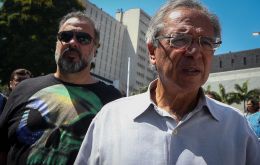
After getting out of its most severe recession in history in 2017, Brazil remains in a state of economic malaise, notching up a mere 1% of growth last year, with public debt forecast to snowball from 77% of GDP to 140% by 2030, according to the World Bank.
-
Thursday, May 17th 2018 - 09:22 UTC
Temer claims that in two years his administration has takes Brazil out of recession
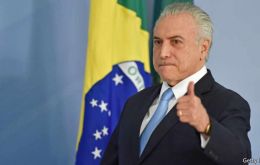
Brazilian President Michel Temer said this week that his administration has taken the country out of debt and successfully overcome the brutal economic recession of the past two years.
-
Thursday, February 8th 2018 - 09:17 UTC
Brazil's central bank beats inflation and recession: eyes now on the presidential election

Brazil’s central bank cut its benchmark interest rate on Wednesday to a new low of 6.75%, but hinted it was now done with a historic easing cycle. The bank lowered the Selic rate by 0.25 percentage point, its 11th consecutive cut aimed at helping Latin America’s largest economy emerge from a stifling two-year recession.
-
Wednesday, May 17th 2017 - 17:44 UTC
.Brazil seems to be climbing out of the worst recession in history
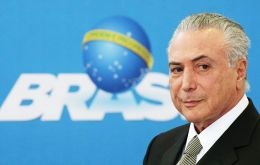
Brazil is set to show a return to growth, the Central Bank indicated Monday, raising hopes that Latin America’s biggest economy could be inching out of a two-year recession.
-
Friday, December 16th 2016 - 08:50 UTC
Simulus measures in Brazil to appease recession and Temer's tumbling credibility
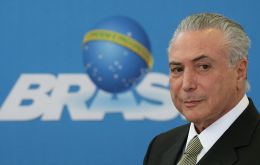
Brazilian President Michel Temer on Thursday unveiled a raft of stimulus measures to reduce the debt burden of businesses and consumers struggling with the country's worst recession on record amid growing popular discontent. Although limited in scope, the measures aim to appease Brazilians angry at the deepening recession in Latin America's biggest economy and allegations of corruption against Temer and his closest allies.
-
Tuesday, May 3rd 2016 - 06:54 UTC
Brazil recession deepens, but prospects for 2017 seem much brighter
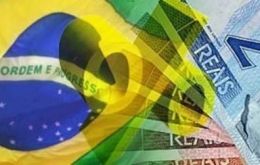
Brazil’s recession is expected to deepen this year as economists brace for an even steeper contraction than in 2015. Economists have downgraded their 2016 outlook for Latin America’s largest economy for the 15th week in a row, according to the weekly Focus survey of about 100 economists by the Brazilian central bank.
-
Thursday, January 28th 2016 - 06:49 UTC
Brazil expected to announce massive injection of loans to revive the economy
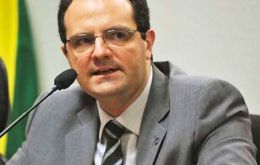
Brazil’s Finance Minister Nelson Barbosa is expected to announce as much as 60bn Reais (US$15bn) in loans as the government seeks to revive growth amid the worst economic downturn in over a century.
-
Monday, September 28th 2015 - 10:35 UTC
Brazil has sufficient reserves, but Rousseff concerned about companies with dollar debts

Brazil President Dilma Rousseff cited the nation's foreign currency reserves as a backstop to excessive volatility and weakness in the Brazilian Real.
-
Thursday, September 10th 2015 - 07:52 UTC
Brazil loses investment-grade credit rating, with outlook remaining negative
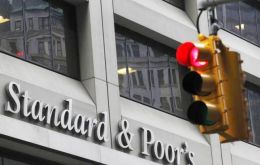
Standard & Poor's has stripped Brazil of its investment-grade credit rating, further hampering President Dilma Rousseff's efforts to regain market trust and pull Latin America's largest economy out of recession.
